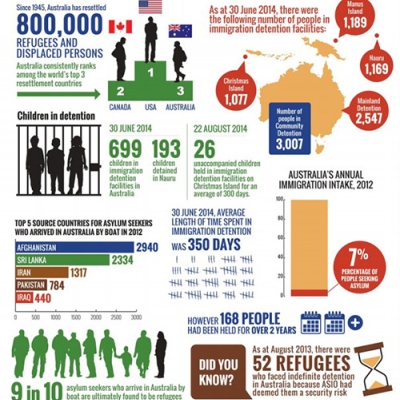Refine results
-
Education25 February 2015Webpage

Face the facts: Asylum Seekers and Refugees
Statistics from 2014 Back to main Face the Facts page All people are entitled to protection of their human rights, including the right to seek asylum, regardless of how or where they arrive in Australia. Australia has ratified the Convention Relating to the Status of Refugees 1951. This Convention defines who is a refugee, sets out the basic rights that countries should guarantee to refugees… -
Aboriginal and Torres Strait Islander Social Justice23 February 2015Project

Moving Forward - achieving reparations for the stolen generations
Learn about a conference held to facilitate debate about reparations for Aboriginal and Torres Strait Islander Children from the stolen generations. -
Employers20 February 2015Webpage
Employers Resources
Available 4 March, 2015. New Employer resources is where you can find resources to help prevent discrimination, respect human rights and promote diversity in your workplace. -
Employers19 February 2015Quick Guide
Transgender
People who are transgender are protected from discrimination by law. The Sex Discrimination Act makes it unlawful to treat a person less favourably than another person in a similar situation because of the gender-related identity, appearance, mannerisms or other gender-related characteristics of the person. Example: A shop assistant refused to serve a person who identifies and presents as a… -
Employers19 February 2015Quick Guide
Unjustifiable Hardship
People with disabilities can face significant barriers in many parts of their lives, including getting into and staying in the workforce and accessing public buildings and facilities. The Disability Discrimination Act makes it against the law to discriminate against people with disabilities in many areas of public life, including employment, using goods and services and accessing public… -
Employers19 February 2015Quick Guide
Vicarious Liability
Employers can be held legally responsible for acts of discrimination or harassment that occur in the workplace or in connection with a person’s employment. This is known as ‘vicarious liability.’ For example, employers can be held vicariously liable for discrimination and harassment that occurs at: employer-sponsored events, such as seminars, conferences and training workshops work-related… -
Employers19 February 2015Quick Guide
Vision Impairment
A guide for employers to support employees with vision impairments in the workplace. -
Employers19 February 2015Quick Guide
Work-related events
An employer can be liable for acts of discrimination or harassment, including sexual harassment, that occur in the workplace or in connection with a person’s employment. This is called ‘vicarious liability’. It means that employers can be liable for acts by their employees that occur at work-related events, such as conferences, training workshops, business trips and work-related social… -
Employers19 February 2015Quick Guide
Working Hours
Offering employees flexible working hours, like other flexible work arrangements, is a way to create a productive workplace that is free of discrimination. In some circumstances, a rule that requires all employees to work certain hours can be indirect discrimination as it may have an unfair effect on some groups of people, such as people with disabilities, women who are pregnant or… -
Employers19 February 2015Quick Guide
Social Media
Social media postings can be against the law if they discriminate against, harass, bully or racially vilify a person. Discrimination occurs when a person is treated less favourably than another person because of a particular attribute they have. Harassment or bullying can amount to discrimination in some circumstances. Inappropriate posts, comments or content shared on social media can… -
Employers19 February 2015Quick Guide
Special Measures
Special measures aim to foster greater equality by supporting groups of people who face, or have faced, entrenched discrimination so they can have similar access to opportunities as others in the community. Special measures are sometimes described as acts of ‘positive discrimination’ or ‘affirmative action’. They are allowed under federal anti-discrimination laws. The Sex Discrimination Act… -
Employers19 February 2015Quick Guide
Tattoos
Employers will sometimes set rules regarding the appearance of their employees in the workplace. However, it is important to ensure that any proposed rules that affect people with tattoos do not amount to discrimination. Discrimination is against the law when people are treated unfairly because of a personal attribute that is protected by law, including race, sex and gender identity -
Employers19 February 2015Quick Guide
Trade Union Activity
It can be discrimination when a person does not experience equal opportunity in employment because of his or her activity in a trade union. This includes being refused a job or dismissed from a job, being refused a promotion, transfer or other benefit associated with employment, given unfair terms or conditions of employment, being refused training opportunities, being refused flexible work … -
Employers19 February 2015Quick Guide
Training
Training for both employers and employees is a key aspect of preventing discrimination and harassment in the workplace. Organisations and employers can undertake training to better understand how they can prevent discrimination and harassment in their workplace. They can also provide training for staff on their rights and responsibilities regarding discrimination and harassment in the… -
Employers19 February 2015Quick Guide
Recruitment
Every organisation aims to recruit the best person for the job. That’s why it is important to be able to select from the widest possible range of applicants. Recruitment processes that are discriminatory reduce an employer’s opportunity to find the best person for the job. Employers who are recruiting staff should be aware of their responsibilities under federal anti-discrimination laws… -
Employers19 February 2015Quick Guide
Religion
Discrimination in employment on the basis of religion occurs when someone does not experience equality of opportunity in employment because of their religion. This may include being refused a job, being dismissed from employment, being denied training opportunities or being harassed at work. Discrimination on the basis of religion alone is not unlawful under federal anti-discrimination law … -
Employers19 February 2015Quick Guide
Sex Discrimination
Sex discrimination explained: unequal treatment based on sex, legal protections, and employer obligations. -
Employers19 February 2015Quick Guide
Sexual Orientation, Gender and Intersex Discrimination
The Sex Discrimination Act makes it unlawful to discriminate against someone because of their sexual orientation, gender identity or intersex status. Sexual orientation discrimination happens when a person is treated less favourably than another person in a similar situation because he or she has a sexual orientation towards persons of the same sex; persons of a different sex; or persons of… -
Employers19 February 2015Quick Guide
Sexual Harassment
Sexual harassment is any unwanted or unwelcome sexual behaviour where a reasonable person would have anticipated the possibility that the person harassed would feel offended, humiliated or intimidated. It has nothing to do with mutual attraction or consensual behaviour. Examples of sexual harassment include: staring, leering or unwelcome touching suggestive comments or jokes unwanted… -
Children's Rights19 February 2015Speech
Ever seen or heard? The voice of children in family law
16th National Family Law Conference Distinguished guests, ladies and gentlemen, it is a privilege to be here today at the 16th National Family Law Conference. Thank you Judge Bauman for the kind introduction. I would like to start by acknowledging the traditional owners of the land we meet on, and I pay my respects to their elders both past and present. I would like to thank Maureen Schull …
